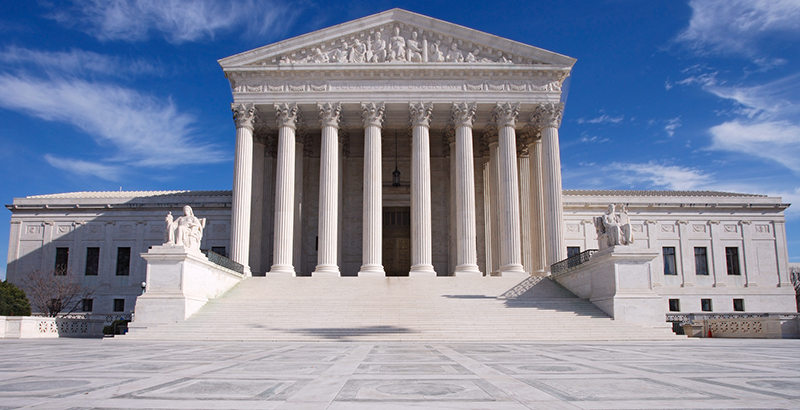How Montana’s Ruling Against Tax-Credit Scholarships Could Push the Supreme Court to Revisit the Religious Schools Issue

Judges in Montana overturned the state’s tax-credit scholarship program as a violation of the state’s ban on funding religious schools, possibly setting up a rematch at the U.S. Supreme Court two years after justices considered a similar issue.
“The Legislature’s enactment of the Tax Credit Program is facially unconstitutional and violates Montana’s constitutional guarantees to all Montanans that their government will not use state funds to aid religious schools,” Justice Laurie McKinnon wrote for the 5-2 majority.
The Montana judges were one of two state courts to decide a similar issue last week, though the high court in New Mexico came to the opposite conclusion in a case involving state-funded textbooks lent to private schools.
Lawyers with the Institute for Justice, a libertarian public interest firm that has brought many religious school choice cases, will appeal the Montana case to the U.S. Supreme Court, attorney Erica Smith said.
Lawyers think it’s likely the U.S. Supreme Court will hear the appeal “because it’s something they’ve been interested in for a long time,” she said.
At issue is the U.S. Supreme Court’s 2017 decision in a case known as Trinity Lutheran Church of Columbia, Inc. vs. Comer. Justices ruled that a religious institution couldn’t be barred from taking part in a publicly available, nonsectarian program (in this case, a church-run preschool applying for a grant to resurface its playground) solely because it is religious.
The case concerned what’s known as a Blaine Amendment, a provision in many state constitutions banning the public funding of religiously affiliated schools, and whether such clauses discriminate against religion in violation of the First Amendment.
Though the primary concern was over religious schools, the court ruled that the program is invalid even for private schools that aren’t religiously affiliated.
The Montana judges didn’t appropriately consider the Trinity Lutheran decision, Smith said.
Judges “explicitly declined to address the federal issues, even though they were right in front of them,” she added.
But Patrick Elliott, staff attorney with the Freedom From Religion Foundation, told The 74 that Smith’s reading of the decision was “totally off-base.” The foundation was not involved in the Montana case, but it has been involved in other church-state-separation issues in schools.
The Trinity Lutheran decision concerned something that “wasn’t a religious activity,” he said, citing a footnote in the decision clarifying that the decision applied only to the playground resurfacing issue.
“Religious schools are certainly a religious activity that the state, under its own constitution, could say this is something we’re not going to tax people in order to support,” Elliott said.
Advocates for separation of church and state praised the decision.
“The Supreme Court’s ruling reinforces the idea that public money belongs in public schools and should not be funneled away to fund private, religious education. The framers of Montana’s constitution recognized and incorporated a strong commitment to maintaining public education and ensuring that public education remains free from religious entanglement,” Alex Rate, legal director of ACLU of Montana, said in a statement.
Attorneys for families who have used the Montana scholarships will immediately appeal to the Montana Supreme Court for a stay of the ruling so that students can again apply for scholarships for the 2019-20 school year. If the state supreme court doesn’t agree to delay their ruling, lawyers will bring the same request to the U.S. Supreme Court.
“Whether we get the stay or not, we will be petitioning for cert at the U.S. Supreme Court,” Smith said.
An appeal of the decision wouldn’t be heard at the U.S. Supreme Court this term, Smith said. The high court’s next term starts in October 2019. Justice Brett Kavanaugh, the newest member of the court, has been publicly supportive of vouchers and has written briefs in cases arguing for public support of school prayer and the use of public facilities for religious activities.
Another case concerning state support of religious institutions is also pending before the high court. Justices on Jan. 4 will decide whether to hear a case concerning whether New Jersey can bar churches from participating in a state-funded historic building preservation program.
Other cases concerning publicly supported private school choice, including ones in Maine and Washington, are still in early legal stages.
New Mexico judges rule for religious schools
In New Mexico, judges ruled that private schools, including religious ones, can participate in a state textbook-lending program.
Providing textbooks to all schools provides benefits to students and therefore the state, and any benefit to private schools is incidental, the justices wrote.
“In Trinity Lutheran, the Supreme Court changed the landscape of First Amendment law. Under Trinity Lutheran, if a state permits private schools to participate in a generally available public benefit program, the state must provide the benefit to religious schools on equal terms,” Justice Barbara J. Vigil wrote for the 3-2 majority.
The ruling is “a great extension” of the Trinity Lutheran ruling, said Eric Baxter, vice president and senior counsel at the Becket Fund for Religious Liberty, which argued for parents seeking to uphold the program at religious schools.
New Mexico judges had decided differently three years ago, ruling that the program violated the state’s Blaine Amendment. The U.S. Supreme Court sent the case back to New Mexico last year to reconsider in light of Trinity Lutheran.
The case could be appealed again to the Supreme Court, but Governor-elect Michelle Lujan Grisham, a Democrat, said she’ll abide by the ruling, the Santa Fe New Mexican reported.
Help fund stories like this. Donate now!

;)
